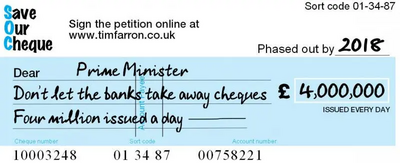TREASURY REPORT BACKS CAMPAIGN TO MAKE SURE CHEQUE SAVED FOREVER

Local MP Tim Farron has today welcomed a report by the Treasury select committee that says that the Payments Council should no longer have the unfettered power to decide the future of cheques, or other payment methods that directly affect millions of people.
Residents and businesses from across our area signed a petition to 'save our cheques' earlier this year. Tim has sent 50,000 petitions to people throughout the South Lakes and has secured over 2,000 signatures from local people.
Tim pressed the issue in parliament and the Payments Council finally agreed to drop the current plans to phase out the cheque in July.
The Treasury select committee report recommends that:
1. The Treasury should make provision in the forthcoming Financial Services Bill to bring the Payments Council formally within the system of financial regulation;
2. The Payments Council must obtain a commitment from the banks to give the Council advance sight of any material related to the future availability of cheques that the banks send to their customers;
3. All banks should be required to write to their customers stating that cheques will continue to be in use for the foreseeable future;
4. The Payments Council should examine the reintroduction of the cheque guarantee card;
5. Changes be made to the composition of the Board of the Payments Council in order significantly to strengthen the voice of consumers. As an immediate first step, any two of the four independent members, rather than all of them as at present, should have the right of veto over a decision of the Council.
Tim said: "Cheques have been saved, for the moment, but we need to remain vigilant. Getting rid of cheques would have caused a great deal of inconvenience to small businesses, charities and many of the most vulnerable people in Cumbria and I am very pleased their voices have been heard."
